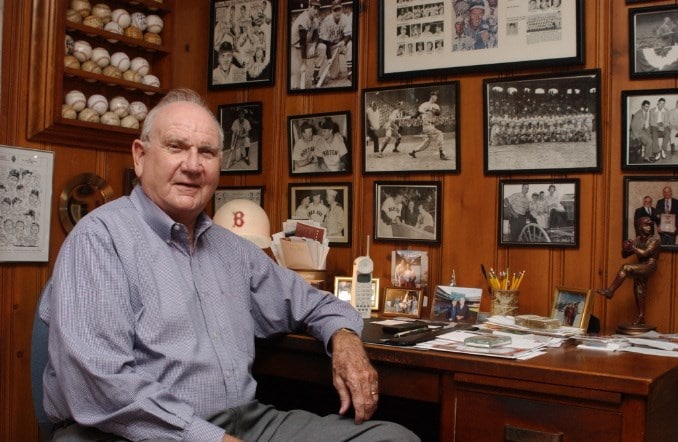Photo Courtesy of DSU Athletics
On this exact day four years ago, we lost not only one of the best athletes to come out of Mississippi but one of the best humans to ever come from this state—Dave Meadow “Boo” Ferriss.
Ferriss, who was born in the small, 1,900-person town of Shaw, played an influential role in the lives of many, many young people—including myself.

I was a mere ten years old when I arrived at my grandfather’s house in Cleveland. My grandfather looked at me, excited yet serious, and asked, “Do you want to meet the best Red Sox player ever?”
Of course, I did. I was that kid who woke up an extra 30 minutes every day before school in order to read the box scores from the day before.
He walked me across the street to this modest, one-story brick house, and within five minutes of entering the home, I had a new friend in Boo Ferriss.
Coach Ferriss, as he became known as following his playing days, for no tangible reason, took a special interest in my life—just as he did with each and every one of his players.
From that day on, he and I would often write each other about anything from who was taking the mound for the Red Sox that next weekend to what sports I was involved in at the time.
The man would even send me every, single edition of Red Sox Magazine (of course after he read them first).
I honestly have never met a person as impulsively generous as Boo Ferriss.
If you’re not familiar with his story, you need to be.
Born on December 5, 1921, Ferriss played all sports growing up, however, his true love was baseball.
He attended Shaw High School, where he got his first start on the baseball team as a seventh-grader. By the time senior year rolled around, scouts from multiple teams, including the New York Yankees and the Cleveland Indians, were recruiting the young switch pitcher.
Nevertheless, his father, W.D. Ferriss, was adamant on Boo furthering his education. Receiving a full scholarship to play baseball at Mississippi State, he packed his bags and made the 131-mile trek to Starkville to play for the legendary Coach Dudy Noble.
After pitching during both the 1941 and 1942 seasons for the Bulldogs, the Boston Red Sox convinced Ferriss to turn pro.
He got one year of professional baseball under his belt with the Red Sox’s Class B team in Greensboro, North Carolina, before being drafted into the United States Army in 1943.
Continuing to pitch during his military years, asthma began to take a major toll on his life.
After being dismissed from the Army and once his health improved, Ferriss dialed up the Red Sox to let them know he was ready to come back.
In 1945, he made his major league debut for Boston, pitching a two-hit shutout on April 29.
It would take 22 innings for Ferriss to finally give up an MLB run—an American League record that stood until Brad Ziegler of the Oakland Athletics broke it in 2008.
Ferriss ended his rookie season with an unheard of 21 wins. The following season, he went 25-6 and was a pivotal piece of Boston’s run to an appearance in the 1946 World Series. The only other pitcher to have more wins in his first two seasons is the great Grover Cleveland Alexander (47).
In 1947, arm injuries, plus an intensification of his asthma, began to plague Ferriss. His playing career, unfortunately, was over by 1950, and baseball fans around the country were saddened to see one of the game’s best pitchers have his career cut short.
From 1955-59, Ferriss served as a pitching coach for the Red Sox before deciding to move back home to Mississippi and become the head coach for Delta State University.
He coached at Delta State for 28 years, boasting an incredible 639 wins and three Division II College World Series appearances. Instantly after retirement, the university inducted Boo into its Hall of Fame.
Ferriss also ended up being honored by both the Red Sox Hall of Fame and the Mississippi Sports Hall of Fame, but the most beautiful part about him was that he utilized the game to positively affect everyone involved.
“I feel his ability to make the game enjoyable for his players separated him from other coaches we had known,” former All-American shortstop under Ferriss and current DSU Head Coach Mike Kinnison said. “He didn’t impose any pressure on us to win, but we had a great desire to succeed because we wanted him to be proud of us. He wanted our best effort but gave great encouragement. Along with that, he constantly reinforced proper conduct, gratitude, and humility.”
I know for a fact that Coach Ferriss, who was known for calling his former players on their birthdays and anniversaries, was proud of everyone he coached—whether he coached them in baseball or just in life, itself.
A portion of the final letter that I received from him months before his passing in 2016 reads, “I am proud of you and your achievements and I look forward to following you.”
I still occasionally make the trip up to Robinson Road in Cleveland and reminisce. I know he’s gone, but I will forever be grateful for what Coach Ferriss did for the game of baseball, but more importantly, for what he did for me as a person.
Rest in peace.







